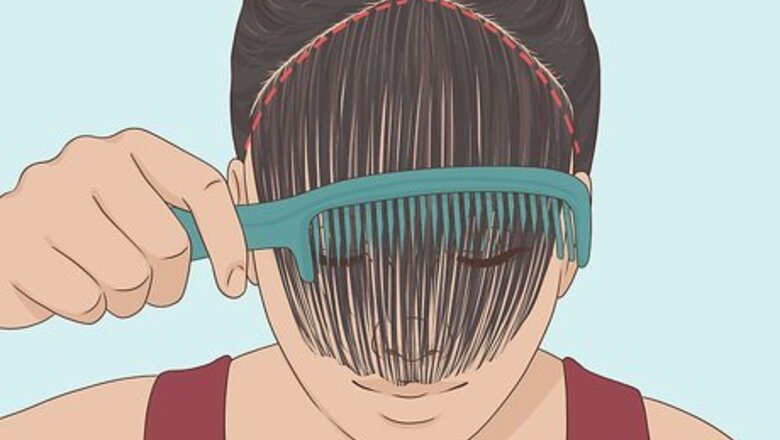
views
Blunt or Straight Bangs
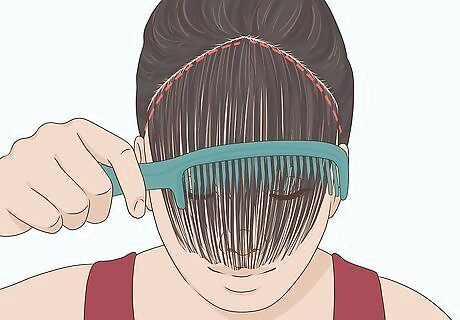
Part your hair to create a triangle in your roots. Take a comb and place the tip of it 1–2 in (2.5–5.1 cm) above your hairline, in the center of your head. You may need to go a bit further back, like 1 in (2.5 cm) or even to the high, flat part of your head where a comb will balance. Then, draw a downward diagonal line from the center of your head to the end of your eyebrow. Then, repeat on the other side. Pull your bangs section towards the middle to separate it from the rest of your hair. You should have a triangle-like shape with the point a few inches above your hairline. The sides of the triangle should slope down along the sides of your forehead. Comb the triangle of bangs forward and pin the rest of your hair back or put it in a ponytail to keep it out of your face.
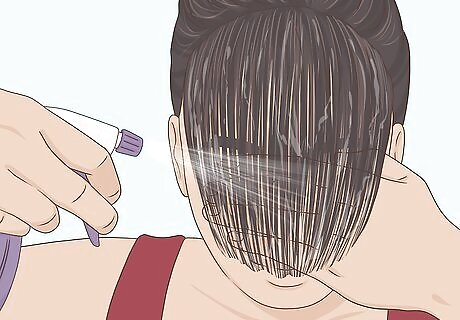
Dampen your hair if you're trimming grown-out straight bangs. If this is your first time cutting your bangs, it's a good idea to keep your hair dry so you can cut it the exact length that you want it. If you're just trimming your bangs, spritz some water onto them so your hair is going in the right direction and lying flat on your forehead. Try using a flat iron on dry bangs to make them straight. It's important that your bangs don't have any wave to them so you can make a straight cut. Keep in mind that doing this with dry hair will be more accurate, but it may also be more difficult. Mist your hair all over with water to get the best results.
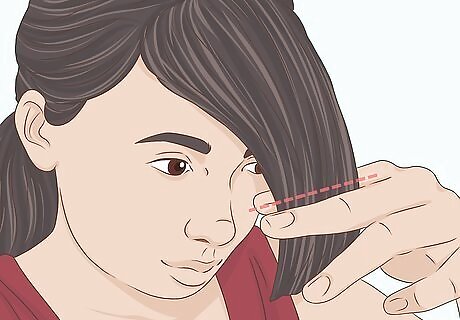
Determine the length and angle of your bang. Straight bangs come in different styles, so figure out exactly how you want them to look before you cut them. Some people like their bangs to go straight across their forehead above their eyebrows for an edgier look, and others like longer bangs that angle down as they meet with the rest of their hair.
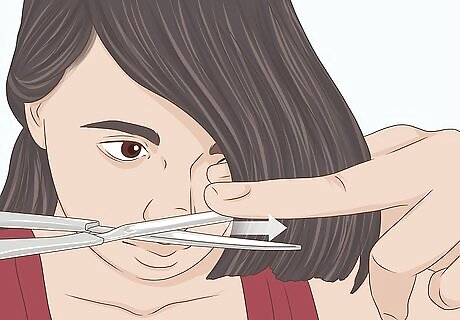
Hold the triangle of hair between 2 fingers to create a straight line. Gather the triangle of bangs and grasp the hair between your index and middle fingers so it's even with the tip of your nose. Your bangs won't be this long, but it's a good starting point in case the bangs don't look perfect right away.
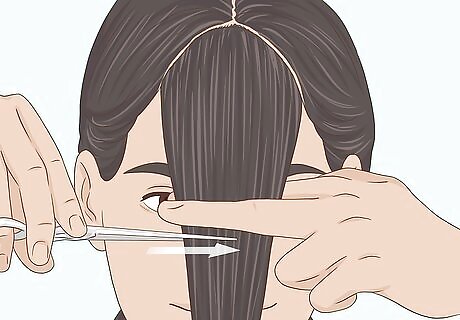
Cut across the hair in front of your fingers in a straight horizontal line. Make a clean snip across the section of hair. Then, move up ⁄4 in (0.64 cm) and follow the same process to create another horizontal cut. Continue cutting your bangs in ⁄4 in (0.64 cm) increments until you reach the desired length. Use a mirror to check the length and make sure both sides of your bangs are even. If your bangs are damp, comb them gently to avoid stretching the hair. Cut them ⁄2 in (1.3 cm) longer than the desired length because the hair will shrink up when it dries. If you want your bangs to angle downward at the ends, cut straight across from the middle of one eye to the middle of the opposite eye. Once you reach that point, begin to cut at a downward angle. Move to the other eye and cut at a downward angle until you reach the rest of your hair. The angle can be as steep or as subtle as you like. It can help to gather your bangs and twist them once before you cut the straight line. This creates a rounded edge on both sides of your bangs, so the bangs are shorter in the front and longer on the sides.
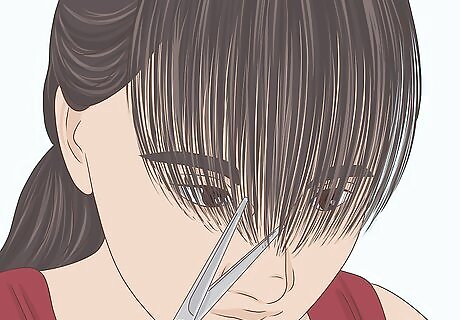
Soften the bottom edge of your bangs by making small snips at the tips. Once your bangs are at your desired length, make them look more natural by taking your scissors and making small snips at the tips of your bangs. Keep the scissors parallel to the strands in your hair. Skip this if you want super blunt bangs with a very straight. You can also use thinning shears for this.
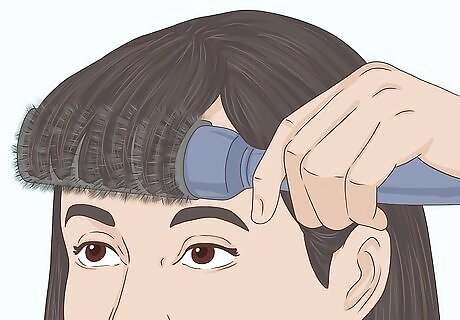
Style your bangs with a round brush or flat iron. Straight bangs usually need more attention, so blow dry them with a round brush when you're styling your hair. If you want your bangs to be super straight and flat, straighten them with flat iron once they're dry. If your hair is naturally curly or wavy, dry your bangs with a flat brush. Hold the brush close to your forehead and move it behind the dryer from roots to ends so you aren't adding volume to your bangs.
Side Bangs
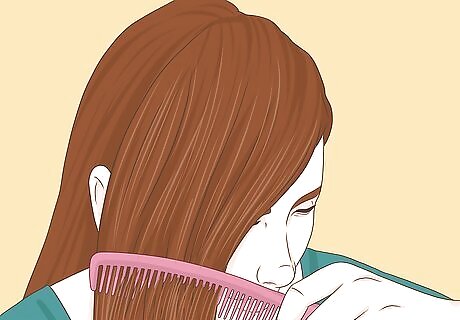
Brush your hair and create a side part where you normally part it. Take a fine-tooth comb and brush your hair until it is smooth and tangle-free. For side bangs, you will need to create a side part. Part your hair to the side it naturally falls on.
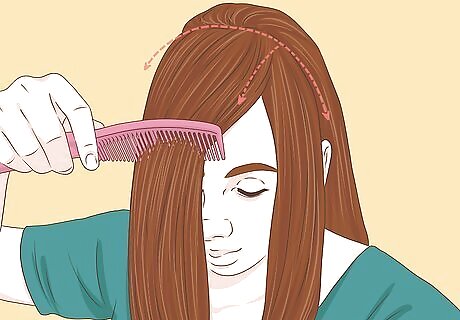
Comb the sectioned hair forward. Taking the tip of a comb, draw a part 1–2 in (2.5–5.1 cm) behind your hairline, perpendicular to your side part. (In other words, from side-to-side, rather than front-to-back.) If you're looking for thicker bangs, you can draw a part farther back. This separates your bangs from the rest of your hair.
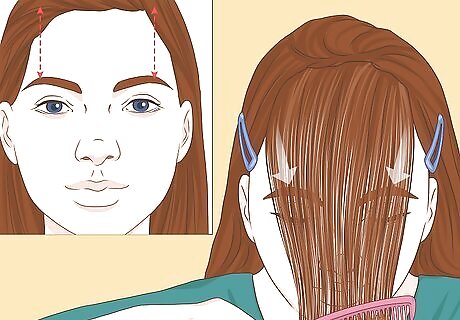
Find the highest tip of your eyebrow. Measure a line upwards from the highest tip of your eyebrow to your hairline. Make a part where that line ends. Move the hair on one side of the part towards the middle of your forehead and pin the hair on the side of your head back to keep it out of the way. You should now have a section of hair in the front center of your face that is separated from the rest of your hair. If you already have bangs, you should have a width already determined, so take your preexisting longer bangs and part them towards the middle, also separating them from the hairline.
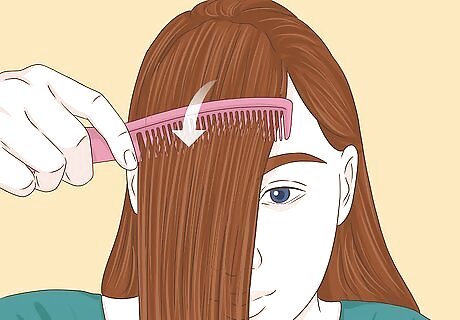
Pull your bangs up and look at them from the side. They should be about 1–2 in (2.5–5.1 cm) thick. If you want thicker bangs, pull more hair forward from the horizontal part behind your hairline. If you want thinner bangs, do the opposite by pulling less hair forward from your hairline part.
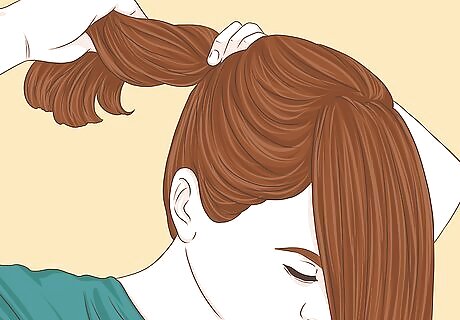
Pin back the rest of your hair. Pull back the rest of your hair with a clip or bobby pins to separate it from your bangs. This will make it easier to cut your bangs without worrying about cutting the rest of your hair.
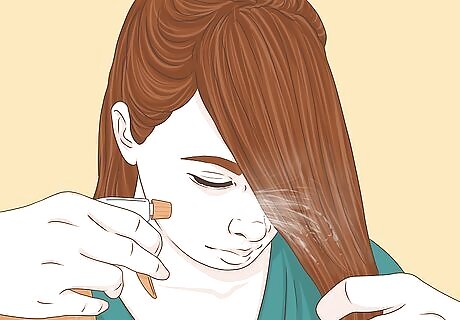
Run a comb through your bangs so they're smooth and straight. This may require you to dampen your hair with a spray bottle if your hair is naturally curly and your bangs have some bounce. Lightly mist your hair with a spray bottle and comb through so that your bangs are flat. If your hair is naturally wavy or straight, cutting bangs in dry hair is best so that you won't cut them too short. Never soak your bangs or make them completely wet. Your hair is longer when it is wet, so when it dries it will be shorter. To avoid cutting bangs that are too short, try to cut your bangs with slightly wet or dry hair. If your hair is very wet before you cut your bangs, blow dry them until they're 80% dry. When blow drying, make sure you are brushing bangs straight down, or in the opposite direction of your part. Don't blow dry bangs downward in the direction they normally would lie. This creates a "rainbow effect" in which your bangs have a high arch to them. It's difficult to cut bangs when they are like this, so it's better to create some volume in the opposite direction.
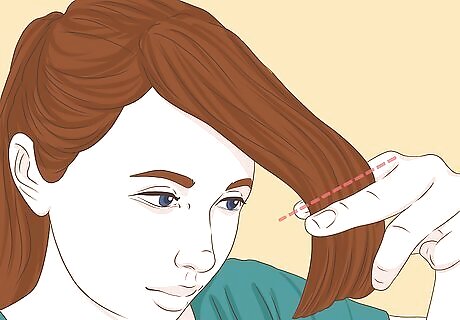
Determine the length of your bangs. Before you cut your bangs you'll want to decide how long you want your bangs. You may want bangs that cover your eye, or you might want bangs that start above your eyebrow. If you're not sure, you can always start with longer bangs and cut them shorter.
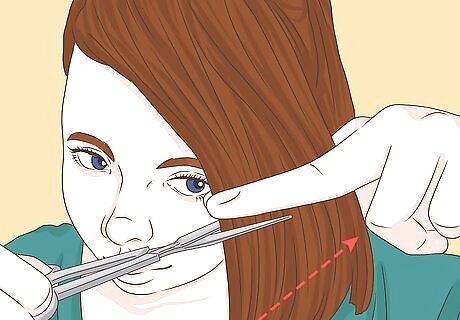
Cut at an angle. Section your hair along a diagonal line and pull it perpendicular to that line. In other words, your hair should be pulled out to the side of your head at a 45-degree angle. Then, bring any other hair you will be cutting out to this angle before cutting. Hold your bangs between your pointer and middle finger and cut the hair below your fingers. If you aren't sure how long you want your bangs, start by cutting at the tip of your nose and ending in a diagonal at the bottom of your ear. This will create long, side-swept bangs. Make sure you are using scissors specifically designed for hair, as this will give you the best cut. If you want shorter bangs, start near the top of the nose, in line with the eye, and cut at a downward diagonal towards the middle of your ear. Always cut bangs longer when you start off -- you can always cut them shorter as you go, but you don't want your first cut to be too short, because there's no way to rewind from there. You can try cutting in ⁄2 in (1.3 cm) increments to make sure you don't cut too much of your bang off.
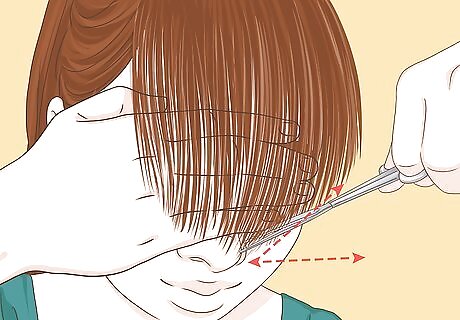
Snip the ends of the bangs to create a softer, more natural look. After you have cut your bangs you may notice that there is a very straight line in your bangs. This tends to look awkward and unnatural, so you may want to give your bangs a little definition. Lift the hair back up to a 45-degree angle and cut parallel to the strands of hair in your bangs, making small snips at the tips of your bangs. If your hair is really thick or you want your bangs to have an even more natural look, you can use a razor made for hair or a hair thinning tool to thin out the ends of your bangs.
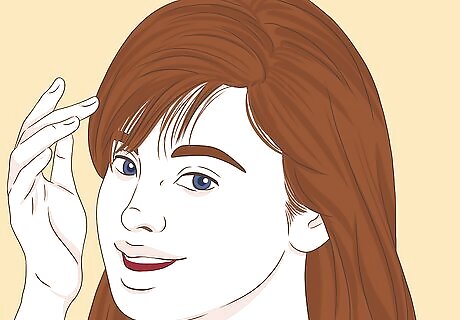
Style your bangs like you normally would. Use a blow dryer and a round brush, brushing your bangs up from the roots towards the ceiling or towards the back of your head. You never want to blow dry your bangs by brushing them straight down as this will leave your bangs with little volume. You can also run a flat iron through your bangs by pulling the flat iron upwards at your roots to create volume. You can also blow dry your bangs in the opposite direction of where they naturally fall to make them lay flat and give them a bit of curl at the bottom. As they are close to being dry, flip them back over and blow dry as usual.
Curtain Bangs
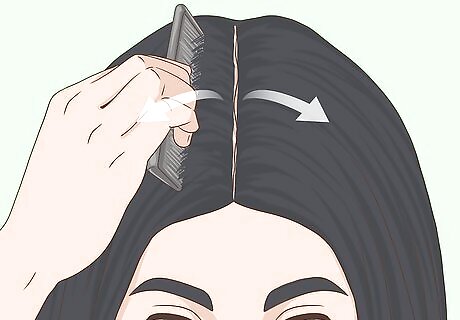
Use a comb to part your dry hair down the middle. Place the tip of your comb in the center of your front hairline (about halfway between your eyes). Pull the comb straight back to the crown of your head to create a center part. Try to make your center part as straight as possible.
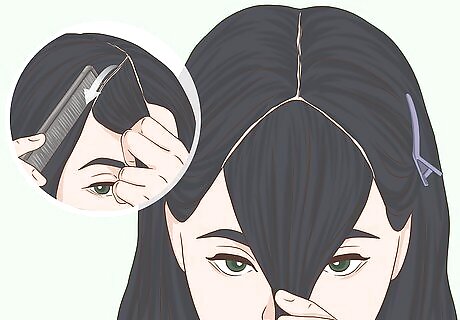
Create a triangle of hair 2–3 in (5.1–7.6 cm) from your hairline. Put the end of your comb on your center part 2–3 in (5.1–7.6 cm) from your hairline. Run the comb from this center point straight down to the arch of 1 eyebrow and comb that hair forward. Do the same thing with the other side/your other eyebrow arch to separate a triangle of hair for your bangs. Tuck the rest of your hair behind your ears or pin it back with hair clips to keep it out of the way.
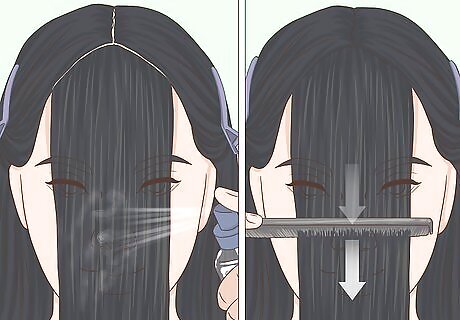
Dampen the separated hair with water and comb it out. Damp hair is easier to cut, so spritz a little water on the triangle of hair that you just separated. Then, run a comb from your front hairline down to the ends of the sectioned hair to smooth it out and remove any bumps or tangles.
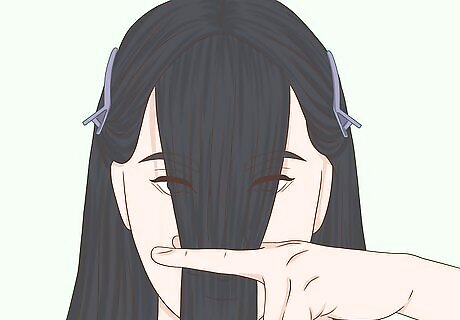
Hold the hair between 2 horizontal fingers at chin or nose length. Grasp the hair between your index and middle finger and run the fingers down the sectioned hair. If your hair is really long, bring your fingers to chin level. If your hair is medium length, bring your fingers to nose level.
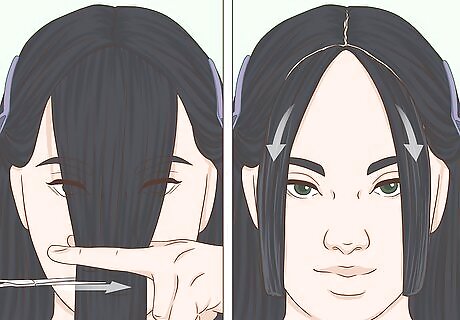
Cut straight across the hair under your fingers. Use your fingers as a guide to make a straight, horizontal cut all the way across the sectioned hair. Once you've removed the length, part the separated hair down the middle to create 2 sections.
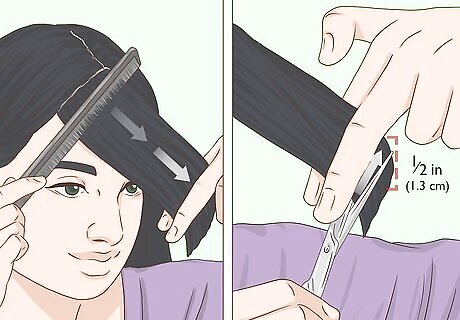
Comb half the bangs and make an angled cut ⁄2 in (1.3 cm) from the ends. Tuck half of the bangs behind your ear so you can concentrate on the other half. Angle the comb at your front hairline so it lines up with the slope of the triangle. Comb the bangs out smooth, tuck the hair between 2 fingers at the hairline, and run your fingers down to the ends. Make an angled cut under your fingers about ⁄2 in (1.3 cm) from the ends. Then, do the same thing on the other half of your bangs. Cutting at an angle creates the soft sloping edge of your curtain bangs.
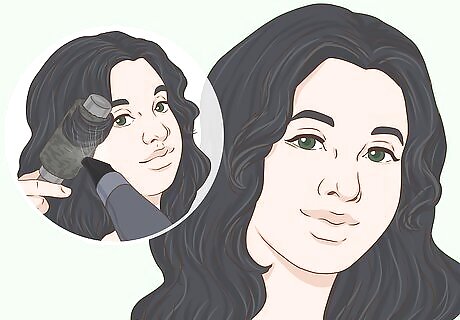
Blow dry your bangs, part them in the middle, and flat iron them. You don't have to do this, but it can soften the edges of the bangs and create a little more texture. Use a round brush to dry the hair, then part your bangs down the center. Use a flat iron to smooth out each side of the curtain bangs. Then, use texturizing shears to thin out and soften the ends of your bangs.

















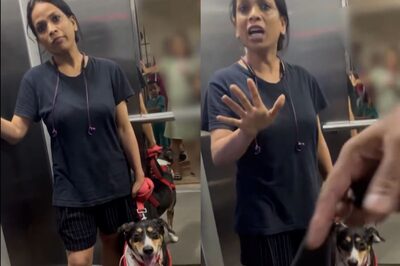

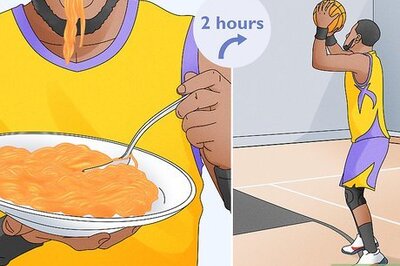
Comments
0 comment